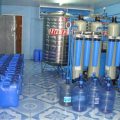It’s impossible to overstate the negative impacts that a lack of access to clean water, sanitation, and hygiene (WASH) can have on human health and well-being. Diseases like diarrhea, typhoid, and cholera are widespread and frequently fatal in communities with poor sanitation. Girls from poor communities are also more likely to miss school than their male peers due to menstruation and inadequate sanitation facilities. Illnesses arising from faulty sanitation and hygiene practices may also impair the productivity of farmers and laborers, which leads, in turn, to overwhelmed healthcare systems and economic decline.
Unfortunately, large disparities in access to adequate water and sanitation continue to trouble the international community today. While most developed countries have achieved universal sanitation coverage, WASH access is much more limited across the developing world. Data from the United States’ Center for Disease Control and Prevention (CDC) estimates that at present, 2 billion people around the world do not have access to safely managed drinking water in their homes. 3.6 billion people lack access to safely managed sanitation at home, which accounts for almost half the world’s total population.
Improving water infrastructure, sanitation facilities, and hygiene education in poor communities is critical for reducing the risk of illness and death in developing countries. Beyond uplifting community health and quality of life, investing in water and sanitation interventions also gives rise to concomitant economic and environmental benefits. For instance, WASH initiatives help reduce the costs of healthcare, improve school and work attendance, and mitigate land and water pollution. On the whole, such initiatives are considered critical for mitigating and eventually eliminating global poverty.
Here are five concrete steps public and private organizations can take to improve the sanitation situation in developing countries:
Make Clean Water More Accessible
Clean water for drinking, bathing, and other daily activities is a fundamental need for people all over the world. In fact, the majority of people from developing countries frequently cite access to clean and safe water when asked about what developments would most improve their quality of life. For this reason, building and maintaining quality water infrastructure should be major priorities for governments and private sector partners looking to improve sanitation.
In essence, water infrastructure refers to any construction that pumps, transports, stores, treats, or delivers clean water to communities and households. Examples of such structures are wells, reservoirs, storage tanks, pumps, aqueducts, water treatment facilities, and many others. Investments in water infrastructure are especially necessary in rural areas, where large fractions of the population are frequently forced to travel long distances to fetch clean water.
When it comes to developing quality water services, organizations must prioritize and observe strict compliance with health, safety, and environmental standards. Tapping into sustainable sources is equally critical, as doing so protects communities from water shortages and ensures adequate water access well into the future.
Spread Hygiene Awareness
Poor sanitation practices such as open defecation frequently arise from a combination of factors. Particularly salient examples include lack of access to toilets and handwashing facilities from Viking Rental, unfamiliarity with modern sanitation technology, and the prevalence of sanitation myths or misconceptions. Experts agree that investments in sanitation infrastructure and technology must come hand in hand with concerted hygiene education to encourage behavioral change.
Studies by the World Health Organization (WHO) show that teaching communities about the relationships between sanitation, health, hygiene, and economic development tends to increase their demand for better sanitation facilities. Hygiene and sanitation education is especially impactful for children, who not only rapidly absorb what they learn in schools but are also often eager to share such lessons with their family members.
Effective education initiatives must begin by understanding the cultural, religious, and social norms that underlie a particular community’s sanitation practices and behaviors. From there, it’s important to bring people’s attention to the impact these behaviors have on themselves, their community, and their surrounding environment.
Encourage Leaders to View Sanitation as a Political Priority
A lack of political will is one of the greatest obstacles to the success of WASH initiatives in developing countries. Many governments, particularly in poorer nations, tend to not see sanitation as a basic need on the same level as access to food and electricity. The persistent and widespread stigma around human waste also tends to hinder active discussion on the subject, particularly among high-profile individuals and organizations.
Needless to say, such attitudes must change in order to break the cycles of ill health and sustained poverty that arise from poor sanitation conditions in developing countries. Political leaders must be informed not only of the dire consequences of failing to prioritize sanitation but also of the immense benefits of doing so. The links between sanitation, public health, and economic development should also be emphasized when making the case for why governments should be investing more in WASH interventions.
Successful WASH initiatives play a major role in improving the health, productivity, access to education, and overall well-being of people who live in developing countries, especially children. They are instrumental in helping inhabitants of poor communities raise themselves out of poverty and live lives with dignity. Hence, it only makes sense for public and private organizations to view sanitation as an essential utility service that should be made available to all people.






